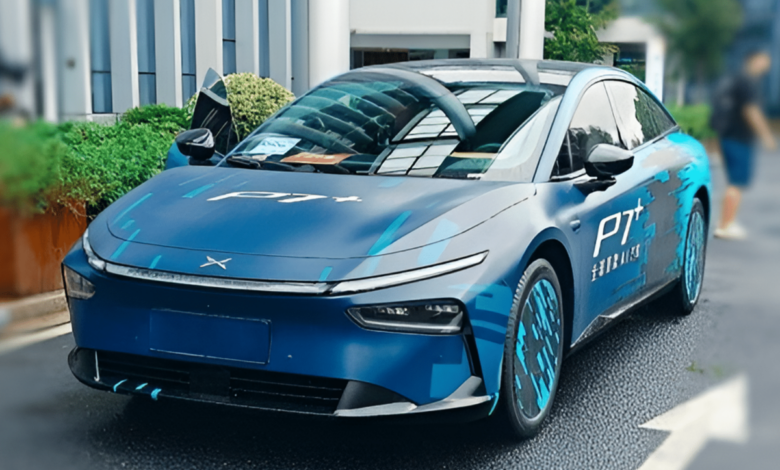Table Of Contents
At the highly anticipated Apsara 2024 Conference in Hangzhou, XPeng’s CEO, He Xiaopeng, made a dramatic entrance, personally driving a camouflaged prototype of the long-awaited P7 Plus. This innovative electric vehicle (EV), branded as the “world’s first AI-powered car,” captured the attention of both the media and industry experts alike. The conference, which centers on cloud computing, artificial intelligence (AI), and future technologies, brought together thought leaders and innovators to discuss breakthroughs such as generative AI and industrial transformation.
Xiaopeng’s participation in discussions on the role of AI in advancing autonomous driving technologies further solidified XPeng’s position as a key player in the race for smart mobility. The unveiling of the P7 Plus highlights the company’s commitment to integrating AI into transportation, presenting the EV as a pivotal development in the future of self-driving technology.
P7 Plus: A Leap in AI Integration and Design Innovation
The P7 Plus represents a significant evolution from its predecessor, the P7i, with a larger body size and advanced AI features. Built on XPeng’s new SEPA 2.0 platform, the car is designed to enhance both efficiency and performance. Measuring an impressive 5.06 meters in length, 1.94 meters in width, and 1.51 meters in height, the P7 Plus boasts a sleek coupe-style design that not only enhances its aerodynamics but also reduces drag.
A standout feature of the P7 Plus is its move towards a camera-based vision system for autonomous driving, shifting away from the LiDAR technology used in previous models. This strategic pivot mirrors Tesla’s approach to full self-driving (FSD) technology, positioning XPeng as a serious competitor in the luxury EV market. By leveraging AI-driven vision systems, XPeng aims to create a safer and more efficient driving experience, with fewer hardware components and a streamlined approach to data processing.
The car’s AI capabilities extend beyond driving. The P7 Plus is equipped with advanced AI systems that can assist with various functions, from route optimization to predictive maintenance. Furthermore, the car’s exterior features, such as C-shaped rear lights with integrated cameras, offer both aesthetic appeal and enhanced functionality, further demonstrating the vehicle’s seamless fusion of design and cutting-edge technology.
Enhanced Performance and Powertrain Options
The P7 Plus offers two powertrain options, catering to a range of performance preferences. The base model features a 180-kilowatt motor, delivering approximately 241 horsepower, while the more powerful version boasts a 230-kilowatt motor, producing around 308 horsepower. Both models are expected to come with 18-inch or 20-inch wheels and can reach a top speed of 200 km/h.
In terms of energy storage, the P7 Plus is powered by a Lithium Iron Phosphate (LFP) battery from Eve Power, although specific details about the battery’s capacity and range are yet to be disclosed. The vehicle’s overall weight varies between the two models, with the base version weighing in at 1,967 kg and the higher-spec version at 2,073 kg.
This new model is set to be produced at XPeng’s Guangzhou factory, with an official release scheduled for the fourth quarter of 2024. It is expected that the P7 Plus will play a critical role in revitalizing XPeng’s sedan lineup, particularly in light of declining sales of the once-popular P7i.
AI-Driven Future of XPeng’s EV Lineup
XPeng’s vision of AI integration in electric vehicles is no longer a distant goal but a reality that is beginning to take shape with the P7 Plus. By focusing on AI-powered autonomous driving systems, XPeng is positioning itself as a leader in the next generation of EV technology. This bold step marks a turning point not only for the company but for the entire electric vehicle industry, which is increasingly looking to AI and machine learning to revolutionize the driving experience.
The company’s current lineup includes the P7i and P5 sedans, the Mona M03, as well as crossover SUVs like the G6 and G9, and the X9 minivan. With the introduction of the P7 Plus, XPeng is actively modernizing its offerings, ensuring that it stays competitive in the rapidly evolving EV market.
By showcasing the P7 Plus at the Apsara 2024 Conference, XPeng has highlighted its dedication to driving the future of smart mobility. The integration of AI into the P7 Plus not only underscores the company’s commitment to autonomous driving but also aligns with global trends in the development of self-driving vehicles. As the vehicle moves closer to its official release, it is clear that XPeng is aiming to redefine what an electric car can achieve through AI innovation.
Conclusion: XPeng’s AI Vision Shaping the EV Landscape
With the unveiling of the P7 Plus at Apsara 2024, XPeng has taken a bold step towards realizing its vision of creating a fully AI-driven vehicle. The company has showcased its ability to innovate, leveraging AI for both autonomous driving and overall vehicle performance. The shift towards camera-based vision systems and the integration of cutting-edge AI technologies set a new standard for the industry, drawing comparisons with Tesla’s Full Self-Driving approach.
As the EV market continues to evolve, XPeng’s focus on AI and cloud computing technologies positions it as a pioneering force in the autonomous driving revolution. The P7 Plus is more than just an upgrade from its predecessor; it is a statement of intent from XPeng, signaling its ambitions to lead the way in AI-powered mobility. With production set to begin in late 2024, the P7 Plus is poised to play a key role in shaping the future of the global electric vehicle market.


